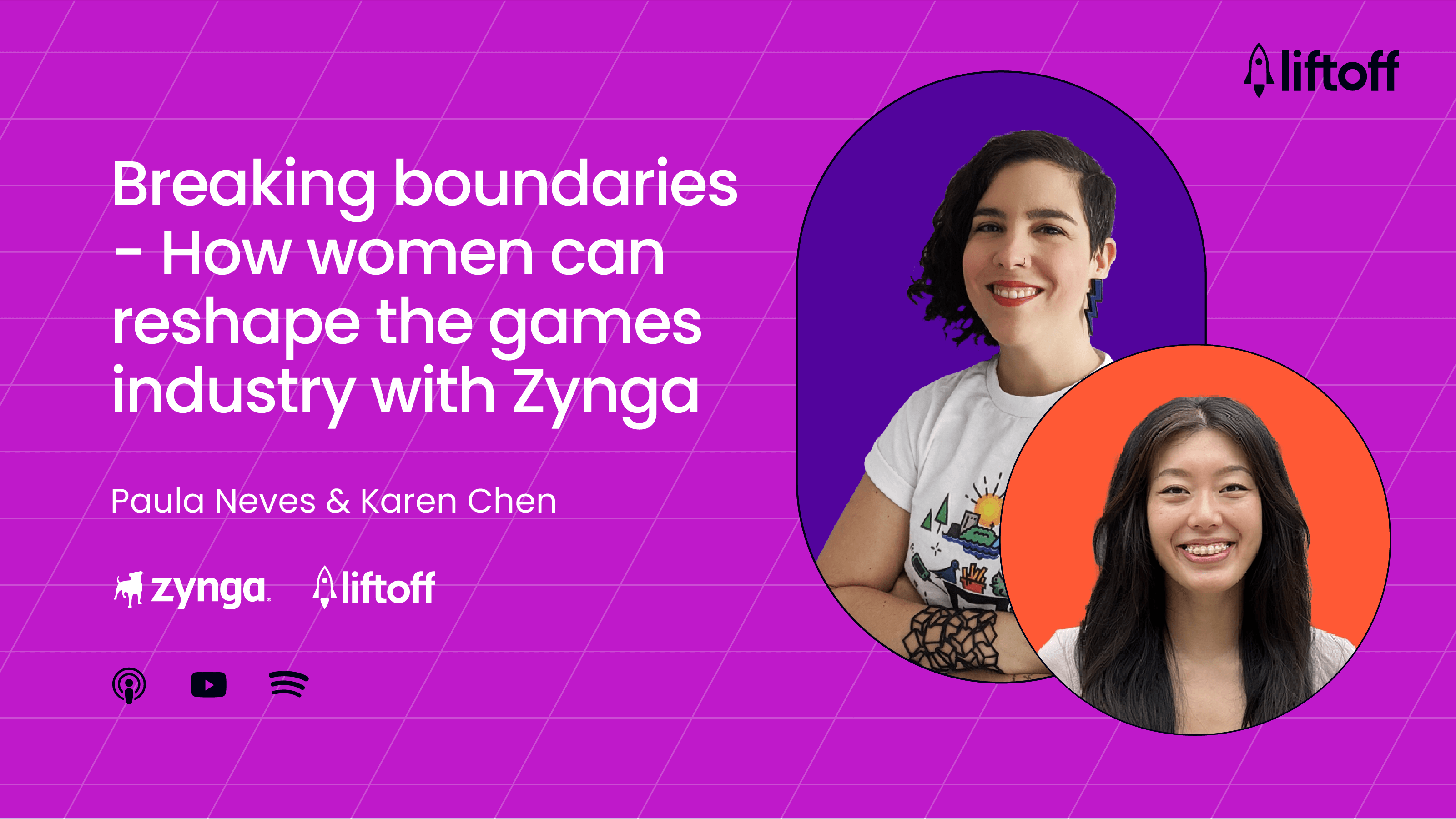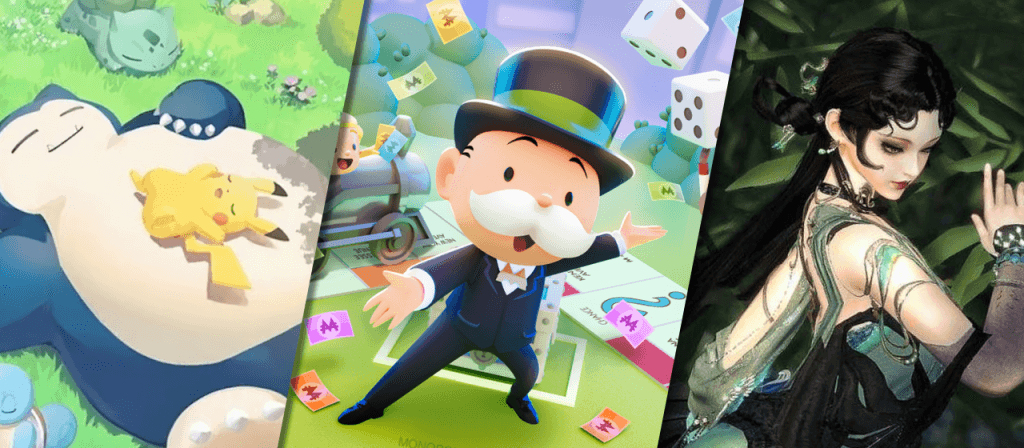This episode delves into the dynamic and diverse world of women in gaming. Karen Chen, Account Executive at Liftoff, and Paula Neves, Senior Product Manager at Zynga, join us to spotlight women’s challenges and discuss their unique perspectives on the industry.
![]()
![]() Spotify, BuzzSprout, TuneInRadio, iHeartRadio
Spotify, BuzzSprout, TuneInRadio, iHeartRadio
– If you enjoy the episode, remember to hit subscribe!
Despite the proliferation of mobile games aimed at women, there remains a concern for more representation of women in various job roles within the gaming world. We will explore the reasons behind this disparity and examine how women gamers often find themselves confined to certain gaming genres, perpetuating limiting stereotypes. We will also tackle the pervasive issue of online harassment and its impact on the gaming experiences of women.
We also celebrate the strides made by the gaming industry to address these issues and promote inclusivity. Discover the emerging initiatives, programs, and opportunities to bridge the gender gap and create a more diverse and welcoming gaming landscape for everyone.
You can also watch the episode on YouTube:
Topics we will cover in this episode:
- Introduction
- Discussing women’s role in the games industry
- Representation and gender in the industry
- Diversity in roles and leadership
- Gender in game design
- Inclusive game development
- Addressing toxicity and culture
- Changing perceptions and empowerment
Read transcript
Introduction
[00:00:00] Jon Jordan: Hello, and welcome to the Mobile Games Playbook. Thanks for tuning in for another episode. This podcast is about what makes a great mobile game, what is, and isn’t working for mobile game designers, and all the latest trends. I’m your host, Jon Jordan. And joining me today, we have two special guests. We have Paula Neves, a Senior Product Manager at Zynga. How’s it going, Paula?
[00:00:22] Paula Neves: Good, good. Thanks for having me.
[00:00:24] Jon: Absolutely. And also, we have Karen Chen, who is an Account Executive at Liftoff. How’s it going, Karen?
[00:00:31] Karen Chen: Doing well, thanks, Jon.
[00:00:32] Jon: Good, good. So, in today’s episode, maybe a little bit different to some of the ones we’ve done recently, we’re going to talk generally about women in games. Obviously, sort of a massive subject, and we can only sort of cover bits of it, maybe anecdotal bits of it.
But, I think it may be good to start off with you, Paula, and I think it’s interesting, one of the sort of issues we have, I think, in the games industry, is how women get into sort of the development, you know, industry side of it, so it might be a good starting point if you can talk us through sort of how-how you got into games.
Discussing women’s role in the games industry
[00:01:01] Paula: Yeah, of course, so I’ve always really loved gaming. Like, since I can even remember, I was playing Enduro and Keystone Kapers, you know, like giving away my age, but on the Atari. So, it has always been something in the back of my mind, but I’m originally from Brazil, and the industry there could be bigger and stronger.
I mean, it is strong in terms of, like, we have really talented people, but it’s not very big. There’s not a lot of investment. So, it was something that slowly I just pushed away from my mind, but my first experience was in this really small studio from Rio De Janeiro called Nano Games. And the way I sort of got into it, it’s because I had a friend that worked there, and we were like ten people, you know?
[00:01:54] Jon: Yeah.
[00:01:55] Paula: And they needed someone to help with everything like product development and on the marketing side of things, you know, those startup type of tasks, and I just went for it, you know. Because I was like, “Okay, this is my chance to start here and work in an industry I love.” So, yeah.
[00:02:12] Jon: And was it something that you thought was a bit weird for games to be a job? Or was that something that you just thought, “Well, of course, gaming’s a big industry? People get jobs in them all the time. Why shouldn’t I get a job there?”
[00:02:24] Paula: No, I didn’t think it was weird at all. I just think it was incredibly unlikely that anyone would land a gaming job in Brazil. And then, when I landed one, I was joyous. I just felt lucky. And then from then on, I think I worked in/for (at the time) most of the big companies in Brazil or Rio that were making and producing games, you know? And then, so I’d say I got pretty lucky. And, of course, I’ve now been in Montreal for four years. I’ve gone to a lot of events, and I know how big the industry is, but that first experience with my friend, that was the, I guess, the start of my workings in the industry.
[00:03:05] Jon: Yeah, cool. I bet it was very, well, quite different from moving from Rio to Montreal. But that’s another story for another time.
[00:03:13] Paula: Yes, that’s definitely, another podcast or webinar.
[00:03:16] Jon: Absolutely. Cool. And Karen, how was it for you [Breaking into the industry]?
[00:03:20] Karen: Yeah, I have a different experience from Paula, but honestly, on my side, advertising had never really seemed like an option before. You know, when you kind of grow up, you’re exposed to ads, and the mobile landscape seems a bit daunting. And so, again, I just kind of came into the industry not knowing much. You know, I completed a few college marketing classes that were telling me like, “Hey, this is what mobile looks like,” right?
So I understood the basic acronyms that I’m more familiar with now, but once I entered the industry, I then realized how big it was. And with advertising, gaming’s obviously a huge portion of that. So from there, I gained a lot of experience working with gaming advertisers across the board, from a wide range of companies, you know, from casual to mid-core type gaming apps. And yeah, I would say most of my experience has been exposure on the job, really.
[00:04:20] Jon: Cool. And this is for either of you to answer this one, have you found, and it may be easy for me to say not being a woman, but my impression of having been in the industry for a while is, as the industry’s got bigger and have more sort of jobs in the industry that aren’t specifically about you know, coding and game development, that in some ways has made it, I think, easier for women to get into the games sort of sector as a whole?
But that doesn’t necessarily mean it’s easier. So how have you found it? Well, actually, over to Paula, as you’ve certainly been in the industry longer. Have you found that there has been a sort of appreciation in the companies you’ve worked at that it’s good to encourage more women to be in the industry, or, you know, I guess I would probably say, tell me if I’m wrong, things are probably moving in the right direction? Maybe they’re not moving fast enough. What’s your view on the trajectory in that respect?
Representation and gender in the industry
[00:05:12] Paula: Yeah, that was a good summary. As we’ve definitely seen, there’s been an improvement, but we are certainly not there yet.
So you do see, if you look at, from a general prism of gender within one company, you will tend to see more and more women representing and working in gaming companies, in general. But when you look at leadership, though, it’s still very, very different and difficult. If you look, women are minimally represented (at the leadership level). And the problem is people talk a lot about companies investing in this (recruiting women in roles). And you see that, especially, like the bigger companies, they put a lot of effort into ensuring equality in the workplace and that women are represented properly, well, most of them. But the problem lies, at least from my point of view, is that it’s a lot like before, it’s only just changed at entry level.
For example, when I was at Gazeus Games, I was a director there, so I had a lot of access to the deciding making process. Interestingly, I was the only female director out of eight and we had a lot of push for hiring the LGBT community and putting them into jobs, and we pushed for women, for diversity in general. But we just wouldn’t get the CVs, we wouldn’t get the women through the door. And that’s because, well, I think, there are several reasons behind it. But once they don’t see themselves represented further up and throughout the industry, they think they need help to work in the gaming industry.
Also, because you go, at least in my time, if you went to university with the hope of getting a job in the industry or for anything that was like computer science, you would be the only girl in the course. And so then it’s something only some survive, right?
[00:06:52] Jon: Yeah.
[00:06:52] Paula: Then, you know, I’m going to give a long answer here, but the final thing I wanted to say is that there was this study created that showed that before the ’80s, a lot of women went into, like computer science roles. We have so many good examples of women programmers way back. Even Ada Lovelace, the first programmer ever, was a woman. And also Carol Shaw, you know, there are so many examples.
But then, things changed. In the ’80s, the personal computer started being a thing. It started being marketed as something for men, and following that, you just see the curve going down for women making it onto the type of courses and then even fewer women going to uni for these subjects. Then even fewer make it out of the class because it’s so tough on them. Especially when you’re the only girl in the class, so I’d say the funnel (of getting women into the video games industry) starts really early. That’s what I wanted to say, but in terms of companies putting in an effort, it’s getting better- it’s getting much better.
Diversity in roles and leadership
[00:07:55] Jon: I don’t want to be seen as sort of provocative, but I mean, do you think it that there are more women programmers specifically? I mean, do you think there are, you know, sort of specific roles that women should be in? Or is there a general rule? Let’s say we got to a scenario where it was 50% women and 50% men. You know, would it matter where they were working or the roles they were in?
Or do you think they should push women into different jobs, let’s say programmers specifically, do you think that would change the way that the sort of companies worked? Would it change the way games were made? What do you think?
[00:08:33] Paula: Yeah, I think we need representation across the board in every single position. Because if you look, it’s very skewed, right? You have a lot of women artists, and you have a lot of women in marketing but not in game development, right? And it’s important because I’ve been in discussions with developers where they were coding a character, and they were talking about stance and things like that. And, like, they weren’t sure. So, it’s always good to have representation. I don’t just mean only gender but diversity in general for a wide variety of people across all different types of roles, for sure.
[00:09:06] Jon: Great. So Karen, how do you see that? I mean, I guess, Liftoff is probably different because you’re an ad company, so you still have coders in there, I suppose, don’t you? So how do you find the sort of gender split between roles in the company?
[00:09:25] Karen: Yeah, I was just about to comment on the point that you were talking about, Paula. I think it’s important to have a more equitable gender across all different roles. Not just in the marketing and creative space, which I feel generally we will and are seeing more female positions in those roles, right? Personally, when I’m working with other UA managers across the board, I would say the split is pretty even. I’m seeing many women and males, like counterparts in that area. But, to the point of like game design.
From the conception of the game all the way to the characters, it’s important for us to have diversity and inclusion to ensure that we’re capturing a greater scope. When I think about myself playing certain games, some are more enticing than others, potentially, for these instances, right? These games could potentially appeal to someone not like me, and it would be nice to see us moving into that more inclusive culture.
[00:10:45] Paula: Yeah. Sorry, I just wanted to just interject because we didn’t touch on pay equity. I also think that that is improving, especially in the gaming and tech industries, you know, but like other industries, there’s still so much room for it to be more equal. Let’s say the Women’s World Cup is happening, right? And I love football. Side note, I’m trying to watch it, but because it’s in Australia (time zone), it’s tough. But anyway, there’s this football player, Abby Wambach, who was one of the biggest icons of the US team in the 2000s. And she won an award when she was retiring. That was huge, right? And on the same day, on the same stage were Kobe Bryant and Peyton Manning. They all got the same award, right?
And while those two guys were thinking about their retirements and what they would do with the millions and millions to invest, Abby was thinking about how she would pay the mortgage that month, right? And that’s a story that I’ve heard from an interview that she conducted, right? So it’s still just bizarre. She’s as big as they are, she got the same award, but that’s the difference, you know? But yeah, I mean, sorry for that interruption.
[00:12:03] Jon: No, it’s interesting because it pulls apart two areas. There’s the pay side of it, as you point out, which is, again, not a sole problem, but a well-understood problem. And there are, well, very few companies in general, but even in the games industry that would have pay disparity, you know, for the same role.
I mean, correct me if I’m wrong, but that would be sort of baked in now those game companies wouldn’t be doing that. Whereas I guess the other problem you’re pointing out, the more sort of pernicious thing, there are more people, in the case of the sports players, who have had 20/30 years at the height of their career, and that’s where the amounts of money been.
Whereas other people have had 20, 30 years as high of that career. But obviously, there needs to be pay equality across that period of time. So you sort of have this lagging indicator, I suppose, in terms of that particular sort of example, which is quite hard to deal with because it’s not a company saying, “We’ve want this producer and this producer, one’s a man, one’s a woman, and we’re gonna pay them the same.” But, I think those sorts of things are much harder to identify and deal with. because I guess they’re, what I’m trying to say is, they’re more cultural rather as a society than just individual company culture, and that, obviously, culture as a whole is a complicated thing.
[00:13:23] Paula: Yeah. Correct.
[00:13:24] Jon: So, I was going to talk a little about, more specifically, mobile games. So I think, generally in the video game industry, there are some games that have a skew of very male, and some games, they skew female, but mobile is sort of interesting as I think, it is a sector that generally is, probably, more female-skewed, if anything. And I guess that would be one area where, I mean Karen is, you’re just sort of more in that space, that you could comment on. So, do you think that given the number of women playing and spending money on games, has it been surprising that there aren’t more women on the mobile game design side, in particular, that haven’t come through more?
Obviously, there are companies that do focus on female gaming and do have female designers. Still, it’s a bit surprising that it hasn’t over-indexed the other way, given how women are such an important audience for mobile games, in particular.
Gender in game design
[00:14:29] Karen: Yeah, I definitely think so given a lot of like the statistics that I was looking into about, you know, almost half, if not half of the women are on these mobile games, I do still feel like there’s a bit of a genre that skews more female. You know, or as I think about it, a Match 3 or some type of like simulation type game is skewed towards women. Or a game that appeals to adventure seems to be more female-driven, and yeah, I do think it is a bit surprising that the industry, as a whole, from the game developers, all the way trickling down, hasn’t been more skewed towards them.
[00:15:19] Jon: They say there have been studios that have tried to focus on women’s games, but actually, it seems to be something that’s quite difficult to make a specifically genre-specific game. I’ve just noticed sometimes that people will often sort of rate. Or not often, but some companies raise money, say we’re going to make games to focus on the female audience particularly, and that seems to be quite a difficult thing to do.
Is that because focusing on gender is actually not a great way to make a good game? Paula, have you got any thoughts on that? I mean, are good games, just good games, and as a result, we shouldn’t maybe worry too much about who we’re targeting in terms of gender or demographics.
Inclusive game development
[00:16:01] Paula: And yeah, I mean, of course, when it comes to UA, you have to know who your audience is and when you’re making games as well, you have to see if the product you’re building has product-market fit, so those things are still important. They can’t be ignored. But I hate, personally, the whole concept of games for women and games for men and for women I just hate that. Like, I’ve played shooters my whole life and all of these things. I go back to the football example, and you said it’s cultural. You’re right, it’s cultural. The problem lies therein, where people perceive that certain things are for boys, and certain things are for girls, when they’re not, right? And you know, that’s where the problem lies, really. And it’s really tough to change. But I grew up hearing all the time, especially growing up in Brazil and where it’s pretty chauvinistic and growing up I’d just hear all the time that the stuff I liked, I wasn’t supposed to like.
And when I was thinking of having a family, I was terrified of having a girl in Brazil. I was terrified. I didn’t want it to be a girl. I wanted it to be a boy. And then I moved to Canada because I didn’t want a girl to go through the stuff I went through it, and now that I’m in Canada, I got pregnant. I had my kid, she’s two and a half years old. It’s a girl, and it’s the best thing you know that it’s a girl, and she’s in Canada, and she gets to get representation all the time, you know? A little example of that cultural thing is when I was taking her to daycare, and she was on the carrier, and there was a renovation going on in the house, like outside. It was five women with hard hats, boots, everything, just women doing the renovation. And when we passed by, she was super smiley. She smiled and waved, and they all smiled and waved. So just right there, of course, she’s two and a half, but she saw a bunch of women doing construction work, you know, and that makes a difference. Construction work is supposed to be for men. So I think I still need to answer your question, but I hope that questions like that aren’t asked for women in the future. And it’s not against you, of course, but I hope that we-we live in a world one day that is not a, you know, a thing, you know what I mean?
[00:18:29] Jon: Again, it goes back to the sort of cultural thing, isn’t it? It’s not these types of things where you need laws for certain things, but there are the harder things to change, which are cultural and just general assumptions, I guess.
[00:18:43] Paula: Yeah, it can be ingrained, you know, like prejudices and so on.
[00:18:46] Jon: I mean, do you think one of your earlier questions, you were talking about sort of leadership, roles, which, you know again, that’s probably sort of a cultural thing to a degree, but it’s harder to do. You know, getting into leadership roles is partly due to the individual.
There may be ways in which you can make it easier for certain types of people. I mean, do you think that’s the main area we need to consider going, in terms of the games companies, you know, as a whole? Is that a key thing, given that there are many people, women joining the industry in various roles? You know, is it more about that, getting women into those sorts of leadership things now?
[00:19:31] Paula: We’ve seen great improvement in the leadership type of things. Looking at it from a general perspective. Of course, we need to continue improving, but it would be interesting if, yes, companies started focusing more on the leadership aspect. I’ve seen that some are much better than others. It makes a lot of difference. In a big company, like Zynga, for instance, in our game, the VP of product is a woman. And it makes a difference because women have a voice in leadership decisions. So it’s important to have people with voices that are mostly overlooked.
So, for me, It would be a big deal if we got to a point where it was almost half-half in terms of leadership. But women tend to think about the whole and not want to hurt people. So they tend not to step on-on other people, so they don’t get promotions as much. They don’t negotiate because sometimes they think it’s not fair. so it’s a cultural thing again, in a way, but companies can and should encourage women to come out more.
[00:20:49] Karen: I was going to say, I think it’s, it’s also important to show those who are younger, and just starting out, that there are people who look like me, are like me, and act like me, in roles of senior leadership. And that’s very important to mould the next generation, so to speak, to ensure that, you know, us women do have a voice and we can be influential in the decision-making process of the industry.
[00:21:16] Jon: It is not necessilary to dip down always to having rules around these things, but sometimes it’s about more subtle changes. If you think about it, crunch in the games industry. Crunch is going to be bad for anyone who’s a carer or has sort of family commitments, which, in our society, tends to be more focused on women.
So it’s not necessarily that women are directly targeted. They’re indirectly targeted. And they find it harder to do management roles because they just can’t throw 80 hours a week at games in a way that men, who have less responsibility, maybe can because their partner or their wife is sorting childcare. Is that something that’s just going to change slowly, obviously, you know, crunch is something that the industry is dealing with on a more structural basis, so that’s a hopeful sign, I suppose.
[00:22:12] Paula: The problem lies in the women sorting out the kids, right? it has to be both, but again, it goes back to the cultural thing. I think that particular part is changing, at least in my generation, in my small circle of friends, at least.
[00:22:32] Jon: Yeah.
[00:22:32] Paula: Like the guys are dividing the work. With me and my partner, that’s exactly how it happens. And nobody says anything. For example, I don’t say, “Oh, he’s helping me.” No, we’re a partnership. He’s not helping; well, I don’t even use the verb because it’s not about help; it’s about dividing. So if he and I were working in a gaming company at the same point and if he was crunching too, that would have been insane for him to manage our daughter. So yeah, as a whole, crunch is bad, and it can’t be there.
[00:23:08] Jon: Yes, yes, yes.
Addressing toxicity and culture
[00:23:08] Paula: But, you know, the problem is it does affect more the women because not all families are like mine, and my friends and more of them should be equal, right?
[00:23:20] Jon: Yeah. Absolutely. So, you may be in the early stages, Karen, but in terms of your career, how do you see the games industry as a place that is now an industry where a woman can have a career for, you know, 30, 40 years? And is it just like any other industry, it doesn’t matter that it’s tech which, you know, it still probably needs to have a great reputation may be outside the industry.
[00:23:48] Karen: Yeah, I definitely think so, but I will say this is not an industry where you’re exposed to early on, especially when you’re growing up. Well, at least for me, it was not something that seemed like a possibility. Paula, you and I were very different in that sense, as I almost went through the normal gender norms way, where my family would take us to get-togethers, and it was just the boys playing Smash Bros in the game room. And it’s like if I play. The first few times I play this game, I won’t be good. I need to learn the controls. Otherwise will only win against you sometimes. And having those experiences affects how I think about gaming growing up in general.
So, there are certain games that I can play, right? I love Candy Crush. Everyone in my life knows that I love Candy Crush. I’m on level 6,000.
[00:24:49] Paula: Oh, wow.
[00:24:50] Karen: That’s how much I love it. But I think if I had kind of gone beyond those gender norms when I was growing up, things might be different in the interest I have for games in general. I might be interested in all the other types of games that are out there. Gaming seemed less accessible for me or, you know, the group of people I spent my time with. As they would say, “I don’t wanna play with you; you’re not gonna win.” and then say “So I’m just going to play with someone who’s-who’s good at it.”
[00:25:21] Paula: Yeah. The social aspect of it is really complicated. Right? I think maybe for me, it was different. I didn’t have a lot of friends so I would play by myself and I got good at playing them. So when I would play at a LAN house or something, I was already good at it because I was playing most of the time by myself playing the game. But there is definitely a divide. For example, I’ve played games for almost 40 years now. And I still haven’t played one single MMO because when I tried playing MMOs back, way back when it was just horrible when they found out you were a girl online, and it was just a horrible experience.
Although the industry is going in a very good way, the gaming industry that is, I feel that the gaming public is going the opposite way. Every time I play, it’s more toxic, and it’s only getting worse and worse from that perspective.
[00:26:20] Karen: Yeah, I’ve recently been on YouTube Shorts and TikTok, and it’s incredible the amount you hear about some of the horror stories of female streamers out there. And so I completely agree with that sentiment, Paula.
Changing perceptions and empowerment
[00:26:36] Jon: I guess the cultural toxicity is something that is spread across the industry and is not a male vs female thing. I think it’s a wider cultural standard we have accepted in gaming, where there’s an inability to be nice to people online. But let’s move on from that one.
So I want to talk about something when you were talking there, Karen, it was something I thought was very interesting. You were talking about, and I hesitate to broach the question, but as we, particularly with mobile games, and Paula, correct me if you need to. Although I know some very competitive women, women generally do not like, or at least most women don’t like competitive games. And I think having the more cooperative type of games, and more community-driven games like Candy Crush games, which do have strong social aspects in them but are not sort of not “I’ve just shot you, and I’m gonna like trash talk you” as you do have on consoles-type games.
It’s quite encouraging, generally, to see how games are viewed in culture and probably within the industry. You were sort of joking there about how you’re such a hardcore Candy Crush fan that you have an insane amount of levels. So it’s never been the case that people who play casual games can’t be super hardcore about playing casual games, I think that has allowed a new community of hardcore gamers, who don’t see themselves as hardcore gamers, but they are in that specific genre. And I think that’s been welcomed in some way by women who don’t actually want to play Call of Duty online, for example.
[00:28:21] Karen: Yeah. That’s a very interesting point. So, on the hardcore casual gamer, if you will. I’m not a big user, and I have not spent much money, but anytime I get a little promotion of 99 cents for an hour of unlimited life, I will sit on the couch and play for an hour. And my partner jokes around sometimes because he plays games, mostly on his PC, but he’s like, “You know, you’re a gamer too, right?” and then says, “You like to sit down for an hour, and you play Candy Crush, and you’re just there.” He’s like, “That’s what I do on my computer, just with my friends,” or whatever it is that he’s doing. So I think that’s a really interesting point.
[00:29:05] Jon: In fact, there was a wider point around that where people– I can’t remember which game it was, or just a few years ago. They were doing surveys with people who were playing games, and there was this sort of state where they said to people, “Are you a gamer?” and lots of women would go, “No, of course, I’m not a gamer, I have no console.”
And then they go, “How many hours do-do you play on your phone?” And they’d reply with something like, “Oh, that’s three hours a day or something.” And the research would be like, “What? You do know that’s the definition of a serious gamer”
[00:29:29] Karen: Yeah, that’s pretty hardcore.
[00:29:30] Jon: If they were playing World of Warcraft, then we’d consider it hardcore gaming, you know, so those, I think, hopefully, over time that that’s changing, and I think the fact people don’t call themselves gamers, I think is probably a good thing because now we know, that three billion of eight billion people in the world are gamers, and if the other five billion people had mobile phones, they’d all be gamers too.
We’re all gamers, well, almost. So, that’s maybe a bit more of a positive view towards the future for women in games. As we’re finishing up now, are there any closing remarks you have or anything you think should be important for the industry to be thinking about to accelerate the sort of changes we’re seeing, hopefully?
[00:30:13] Paula: I think that, as Karen said in one of her answers, representation is really important. More women need to see women there to be able to think, “Okay, I can do that too.” So, if, as a company, you have speaking opportunities, and you can send women, send them. Again, as a company, if you have a few women in leadership roles, try to put them there and then try to understand women from that perspective. From the perspective of how women grew up in culture and society, they want to tend to everyone and take care of everyone.
They won’t push hard for it (promotions), but as a leadership team, you have to go and do more of the pushing yourself to see if she’s interested. So, that’s why we don’t see that much out there. It needs an extra, and it needs a female eye to begin with, right? To be able to get those promotions and to get those things right.
You need those strong leaders to say, I’ve been in their position, and I needed encouragement. For example, I’ve been in interviews for companies and was in a position to say something. I wasn’t the person that was hiring like I didn’t have the veto power or anything. Still, I was talking to the person who said, “Listen, we’re interviewing a girl; you need to go this way with your questions. Because if you do, she will give you more information, and she will start self-affirming more and start giving you the answers you want to hear” You know? So yeah, you need a female eye, and companies should be doing that and trying to figure out, “Okay, if she’s the best candidate for the promotion, she’s not pushing for it. Let me push for it on her behalf.”. Representation over and over and over again.
[00:32:11] Karen: Plus one to everything you just said, Paula. I think taking things may be more specific to the gaming community in general. It would be great to foster an open community for kids and girls in general. To show them that you can grow up and understand that there is a community for everyone in this world. It’s sometimes tough to understand, again, from my perspective, that gaming is not male-focused; it’s for everyone.
So how can we combat some of these more innate, what you’d call, gender norms? How do we break across that so there are opportunities for all of us? I’m hopeful we’re able to see that through the years ahead.
[00:33:08] Jon: Well, thank you very much, Karen and Paula. Thank you for your expertise and for discussing the subject. I hope you found that useful, and thanks to you for watching, listening, or however you are consuming the podcast.
In every episode, we are talking to people in the mobile games sector, so there are different aspects I hope you’ve enjoyed this episode, which is slightly different to some of our other ones, but please, come back next time to see what’s going on, in the world of mobile games. See you then, goodbye.
[00:33:13] Karen: Thank you.
[00:33:13] Paula: Thank you.





















